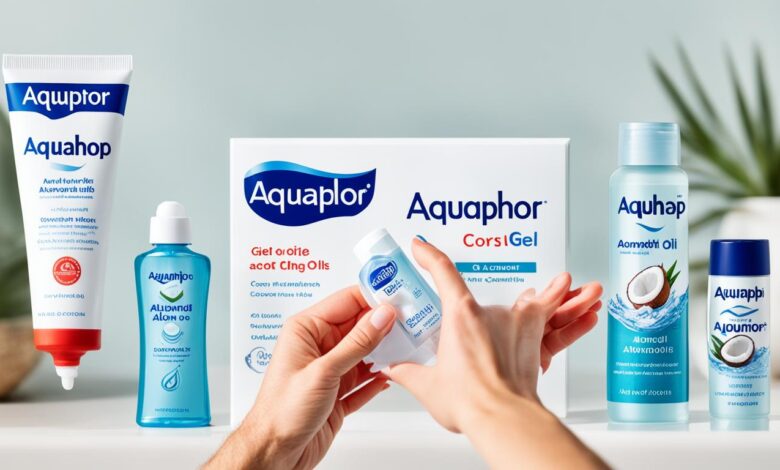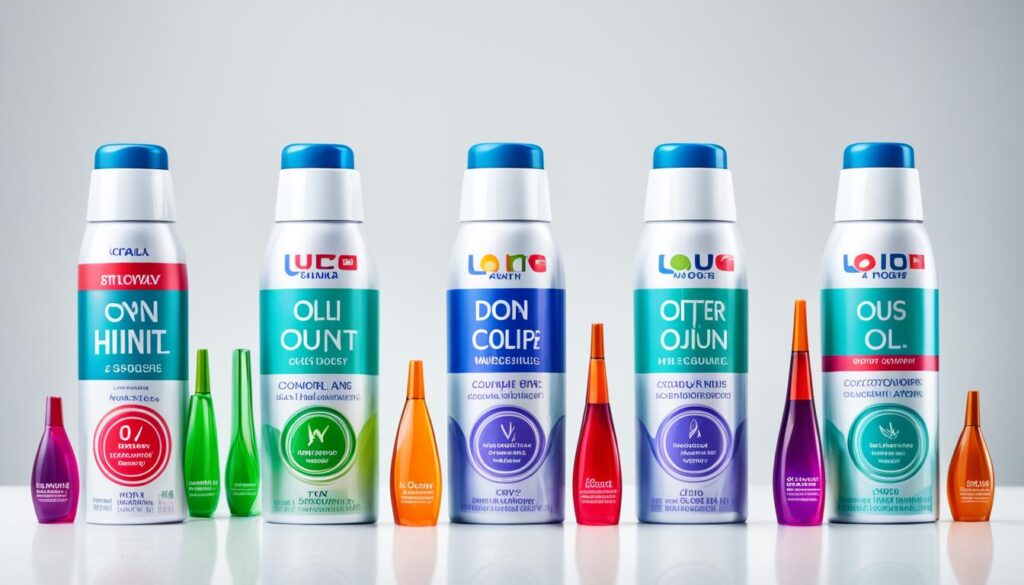Can I Use Aquaphor as Lube? Safe Alternatives

Many wonder if Aquaphor can be used as lube. This versatile ointment has sparked curiosity among those seeking safe alternatives. Let’s explore Aquaphor’s safety for intimate use and discuss other lubrication options.
Intimacy products often have multiple uses. People are always looking for efficient and safe alternatives. Aquaphor, being a versatile ointment, has caught attention in this regard.
Key Takeaways
- Aquaphor is not formulated for intimate lubrication and may not be the safest option for sensitive areas.
- Water-based and silicone-based lubricants are generally considered safer and more compatible options for sexual intimacy.
- Natural oils like coconut oil and almond oil can be used externally but should not be used with latex condoms.
- Certain ingredients in store-bought lubricants, such as chlorhexidine gluconate, fragrances, and spermicides, should be avoided.
- Dedicated intimate lubricants are designed to prioritize safety, comfort, and compatibility for sexual activities.
The Curiosity Around Using Aquaphor as Lube
Many wonder if Aquaphor can be used as lube. This popular ointment is made to moisturize dry skin. Its gentle formula makes it a go-to for various skincare needs. People often ask if it’s suitable for intimate lubrication too.
Can you use Aquaphor as lube? Exploring the Potential Multifunctionality
Aquaphor’s versatility is appealing, but caution is needed for intimate wellness. It’s not made for intimate lubrication. Using it in sensitive areas might not be safe.
Let’s look at the concerns and explore safer options. These alternatives are specifically designed for intimate use.
“Aquaphor Healing Ointment can be applied to the area between the lips but not inside the vagina if the genitals feel dry.”
Understanding the Safety Implications
Using Aquaphor as an intimate lubricant can be risky. While safe for external use, it’s not ideal for intimate purposes. There are better options available.
Women using petroleum-based products vaginally face higher risks of bacterial vaginosis. These lubricants can weaken condoms, increasing chances of breakage during sex. This may lead to unintended pregnancy or STI transmission.
Water-based lubricants like KY Jelly or Astroglide are safer choices. They’re designed for sexual activity, providing effective lubrication with minimal irritation risk.
| Lubricant Type | Safety Considerations |
|---|---|
| Petroleum-based (e.g., Aquaphor) |
|
| Water-based (e.g., KY Jelly, Astroglide) |
|
The WHO recommends water-based lubricants with specific pH levels for different types of intercourse. This helps maintain natural pH balance and reduces irritation risks.
Aquaphor isn’t ideal for intimate lubrication despite its other uses. For safety and comfort, choose lubricants made specifically for sexual activity. Water-based or silicone-based formulas are your best bet.
Aquaphor: Not Formulated for Intimate Lubrication
Aquaphor isn’t designed for intimate use. Its formula may not suit the delicate vaginal environment. Let’s explore why this versatile ointment isn’t ideal for personal lubrication.
Why Aquaphor May Not Be Suitable for Intimate Areas
Aquaphor’s ingredients, including aquaphor not for intimate use, aren’t ideal for intimate lubrication requirements. Its fragrances and additives could disrupt vaginal pH balance. This may lead to vaginal irritation and compromise intimate comfort.
Aquaphor isn’t made for long-lasting lubrication during intimate activities. Its texture may not enhance the experience like specialized intimate lubrication products do.
Sterility is another concern with Aquaphor. Using non-specialized products can increase the risk of introducing harmful bacteria. This may result in vaginal irritation or other health issues.
Aquaphor works well for various skin conditions. However, it’s not the best choice for intimate lubrication requirements. Choose dedicated personal lubricants for safe and comfortable intimate experiences.
can i use aquaphor as lube
Using Aquaphor as lube isn’t recommended due to safety concerns. It’s better to find alternatives made for intimate use. Prioritizing safety and effectiveness is crucial for intimate wellness.
Aquaphor is for external use only. It’s not made for intimate lubrication. Using it can cause problems with condoms, toys, and vaginal health.
A U.S. study found issues when 141 women used Aquaphor as lube. It weakened latex products. This increases the risk of condom breakage during sex.
Despite being cheap and easy to find, Aquaphor isn’t safe for intimate use. Look for intimate lubrication alternatives designed for this purpose. These options ensure comfort and enjoyment.
Personal Care Product Versatility
Aquaphor’s thick texture may seem appealing. It stays smooth longer than water-based lubes. It’s also glycerine-free, which is good for sensitive skin.
However, Aquaphor isn’t made for intimate use. Using it as lube comes with significant risks. Most people worry about introducing harmful bacteria during intimate activities.
Aquaphor is versatile, but not suitable as an intimate lubrication alternative. Your safety and comfort should come first. Choose products specifically designed for intimate use.
Exploring Safer Lubricant Alternatives
The right lubricant can greatly enhance your intimate experiences. Aquaphor isn’t designed for intimate use. Water-based and silicone-based lubricants are safer and more suitable options.
Water-Based Lubricants: A Gentle and Versatile Option
Water-based lubricants work well with condoms and sex toys. They’re easy to clean up and less likely to cause irritation. This makes them ideal for sensitive skin and long-lasting activities.
For a more natural experience, choose water-based lubes without parabens or glycerin. These gentle formulations offer comfort and versatility for various intimate needs.
Silicone-Based Lubricants: Long-Lasting and Compatible
Silicone-based lubricants provide a smooth, long-lasting glide. They’re great for anal sex and can be used in water. However, be careful with silicone toys, as the lube may damage them over time.
| Lubricant Type | Pros | Cons |
|---|---|---|
| Water-Based |
|
|
| Silicone-Based |
|
|
Choose a lubricant based on your needs, preferences, and any sensitivities. Consider factors like compatibility and personal comfort. Exploring these safer options can lead to more enjoyable intimate experiences.
Natural Oils as Lubricants
Natural oils offer an alternative to synthetic lubricants. Coconut and almond oils are safe for external use. Be cautious, as oil-based lubricants can weaken latex condoms.
Choosing the Right Natural Oils for Intimate Use
Vegetable, sunflower, and vitamin E oils are potential natural lubricant options. Check their compatibility with your contraceptive methods. Some oils can damage condoms and cause skin issues.
Aloe vera gel, with high water content, can be a gentle alternative. It’s less likely to irritate or disrupt vaginal pH balance.
Safety and comfort are key when choosing natural lubricants. Consider compatibility with contraceptives and sex toys. Consult a healthcare professional for personalized advice.
“Using the right lubricant can make all the difference in having a comfortable and enjoyable intimate experience.”
Lubricants to Avoid for Intimate Activities
Certain products should be avoided as sex lubricants during intimate activities. These include animal-derived substances, cleansing products, and creams. Saliva, sugary substances, and synthetic oils are also unsafe choices.
These ingredients can disrupt the delicate vaginal environment. This may lead to intimate irritation, infections, and other unwanted consequences. Such issues can compromise vaginal health and personal care product safety.
Vaseline is not recommended for intimate activities. It may cause skin irritation and increase the risk of condom breakage. KY Jelly contains ingredients that could lead to vaginal dryness and infections.
“Tingling” or “cooling” lubricants may contain harmful chemicals for genital tissue. Coconut oil may disrupt vaginal flora and isn’t compatible with latex condoms.
Body lotions, hand creams, and liquid soap aren’t designed for internal use. They could affect vaginal pH and cause irritation. Hand sanitizers should also be avoided for intimate activities.
Choose dedicated, vagina-friendly products for safe and comfortable intimate experiences. Avoid unsafe lubricant alternatives to protect your health.

Check the ingredients in any product before using it as a lubricant. Consult a healthcare professional for informed choices about vaginal health. Prioritize your well-being when selecting intimate products.
Important Ingredients to Steer Clear Of
Be mindful of the ingredients in your intimate lubricants. Many store-bought products contain substances that can irritate the delicate vaginal area. These products may disrupt vaginal health.
Potentially Irritating Ingredients in Store-Bought Lubricants
Some common ingredients to avoid in intimate lubricants include:
- Chlorhexidine gluconate – This antimicrobial agent can cause burning, stinging, and irritation.
- Fragrances – Synthetic fragrances can trigger allergic reactions and vaginal irritation.
- Glycerin – This humectant can contribute to yeast infections and disrupt the natural vaginal pH.
- Propylene glycol – This preservative can lead to irritation and sensitivity in some individuals.
- Spermicides – Ingredients like nonoxynol-9 can disrupt the balance of vaginal bacteria and increase the risk of infections.
Be cautious of lubricants claiming “cooling” or “tingling” effects. These often contain ingredients that can increase sensitivity and potential irritation. Read labels carefully to avoid these potentially harmful substances.
Choose products specifically formulated for intimate use. This approach helps maintain vaginal health and reduces the risk of irritation. Your personal care product safety deserves careful consideration.
The Benefits of Using Dedicated Lubricants
Dedicated intimate lubricants offer many advantages for personal comfort and sexual wellness. These products are specially made for vaginal health and sexual activity. They provide a gentler solution compared to generic household items like Aquaphor.
Dedicated lubricants enhance comfort and reduce friction during sexual activity. They mimic the body’s natural lubrication, smoothing the way and minimizing irritation. This helps people with vaginal dryness, a common issue affecting sexual wellness.
Dedicated intimate lubricants contain gentle ingredients that work well with the delicate vaginal environment. They help maintain the natural pH balance and protect the vaginal flora. This reduces the risk of infections or irritation.
Using dedicated intimate lubricants can lead to a more positive sexual experience. They enhance comfort and reduce discomfort, helping people feel more relaxed and confident. This supports overall sexual wellness and allows for fuller engagement in the moment.
When choosing dedicated intimate lubricants, look for products designed for vaginal and vulvar health. Ensure they’re free from irritating ingredients. Prioritizing safety and comfort can unlock the full benefits of these specialized products.

Prioritizing Safety and Comfort
Safety and personal comfort are crucial for intimate wellness. Many wonder about using Aquaphor as lubricant. However, everyday products aren’t designed for intimate use and may cause health issues.
Aquaphor, a trusted skincare ointment, is formulated for external application and not suitable for internal or intimate use. Using it as lubricant can disrupt vaginal or anal pH balance. This might lead to irritation or infections.
Dedicated lubricants are safer for intimate activities. Water-based and silicone-based options enhance sexual wellness and vaginal health without risking intimate safety.
- Water-based lubricants offer a gentle, versatile solution that is compatible with most sexual activities and toys.
- Silicone-based lubricants provide a long-lasting, smooth glide that can enhance personal comfort during intimate moments.
Choose lubricants carefully by reviewing ingredients. Avoid irritants like parabens, glycerin, or petroleum-based products. Pick a lubricant that suits your unique needs for a safe experience.
“The use of lubricants during or prior to sex can improve sexual well-being, with no significant impact on the incidence of human papillomavirus,” according to a review of seven studies on the effectiveness of lubricants.
Prioritize safety and comfort in intimate activities. Use dedicated lubricants and avoid products not meant for internal use. This approach ensures a fulfilling and worry-free intimate experience.
Conclusion
Aquaphor isn’t safe for intimate lubrication. It may cause discomfort or other issues. Instead, opt for dedicated lubricants like water-based or silicone-based options for a safe experience.
Water-based lubricants are health-friendly and work well with condoms and toys. Silicone-based ones last longer but aren’t suitable for condoms. Natural oils can be used carefully as lubricants.
Using proper lubricants is vital for comfort and sexual health. Avoid harmful products like Vaseline, baby oil, or household items. Make informed choices to enjoy a safe and fulfilling intimate life.
Prioritize your health and comfort for worry-free intimate experiences. Explore safe lubricant options to ensure pleasure and safety. Your well-being matters most in intimate moments.
FAQ
Can I use Aquaphor as lube?
Aquaphor is not recommended for use as a personal lubricant. It’s designed for external skin care only. Using it for intimate purposes may cause irritation or discomfort.
Why is Aquaphor not a good choice for intimate lubrication?
Aquaphor contains fragrances and additives that could upset the vaginal environment. Its texture may not provide lasting lubrication during intimate activities.
Aquaphor is not sterile, which increases the risk of introducing harmful bacteria. This makes it unsuitable for intimate use.
What are better alternatives to Aquaphor for intimate lubrication?
Water-based and silicone-based lubricants are safer and more effective for intimate use. These are made specifically for such activities.
They enhance comfort, reduce friction, and protect delicate tissues. Choose products designed for intimate use to ensure safety.
Can I use natural oils as lubricants?
Some natural oils, like coconut and almond oil, can work as external lubricants. However, avoid using oil-based lubricants with latex condoms.
Oils can weaken latex and reduce its effectiveness. Other options include vegetable oil, sunflower oil, and vitamin E oil.
Always check if your chosen lubricant is compatible with your contraceptive method.
What ingredients should I avoid in intimate lubricants?
Avoid lubricants with chlorhexidine gluconate, fragrances, glycerin, propylene glycol, and spermicides. These can cause burning and irritation.
They may also disrupt the natural vaginal flora. Be cautious of lubricants with “cooling” or “tingling” effects.


